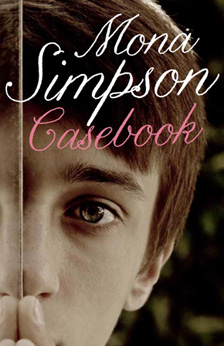Hot coffee and no haiku
by Mona Simpson Mona Simpson is lauded as a sharp and infectious chronicler of American family life. Her latest novel, Casebook, is a coming-of-age story about two boys who unearth powerful secrets that threaten a family’s health and sanity. She invites us into her home and gives an insight into her literary habits.
Mona Simpson is lauded as a sharp and infectious chronicler of American family life. Her latest novel, Casebook, is a coming-of-age story about two boys who unearth powerful secrets that threaten a family’s health and sanity. She invites us into her home and gives an insight into her literary habits.
Where are you now?
At my kitchen table.
Where and when do you do most of your writing?
Here. Lately, right here. I have a small office in downtown Santa Monica that’s currently empty. The subletters – London filmmakers – left a week ago and I’ll have to decide whether or not to resume working there. It has pretty views, but I like working near the refrigerator.
If you have one, what is your pre-writing ritual?
I almost always make a hot beverage. Before 4 pm, Yirgacheffe coffee. Later on, Yogi Egyptian licorice tea.
Full-time or part-time?
Do I drink hot beverages full-time or write full-time? In either case, the answer is yes.
Pen or keyboard?
Both. First pen, then Macbook Air. Then I print out, and use the pen again. This cycle repeats itself hundreds of times.
How do you relax when you’re writing?
Writing and reading are relaxing for me, deeply so. If you want to exhaust me, take me shopping for an hour in a mall. When I haven’t been able to read and work long parts of the day for a while, it takes me days to settle back into a state of relaxation to write. Those times, I treat myself delicately. I stay home evenings. I run daily. I eat abstemiously. I read and wait.
How would you pitch your latest book in up to 25 words?
I would NEVER pitch my latest book (or any of the other five) in up to 25 words. That’s the job of people who sell books, not someone who writes them. If we thought of them in 25 words or under we’d be writing ad copy or haiku.
Who do you write for?
I write for someone I don’t know who’s alone, rambling around a library one day, needing a book like this. Or not knowing what she needs, but recognizing parts of herself, hidden parts, in this novel and through reading, maybe she views herself and her life a little differently.
Who do you share your work in progress with?
I share my work with my editor Ann Close and with a few writer friends.
Which literary character do you wish you created?
Oh, so many of them. Casauban. Dr Lydgate. The tutor who writes home describing every course at the Rostov’s banquet in War and Peace. Madame de Guermantes. Swann. Starbuck. Bartleby. Violette.
Share with us your favourite line/s of dialogue, poetry or prose.
Oh Western Wind when wilt though blow
That the small rain down can rain?
Christ, that my love were in my arms
And I in my bed again!
– ‘The Lover in Winter Plaineth for the Spring’ (Anon., 16th century)
Which book do you wish you’d written?
Too many to list.
Which book/s have you most recently read and enjoyed?
I loved Elena Ferrante’s My Brilliant Friend and The Story of a New Name. I’m in the middle of the third installment, Those Who Leave and Those Who Stay.
What’s on your bedside table or e-reader?
I’m listening to Andrew Solomon’s wonderful Far From the Tree on my phone.
Which books do you feel you ought to have read but haven’t yet?
Again, an endless list.
Which book/s do you treasure the most?
I treasure the books that have somehow reached in and changed the course of my life. When I was a child, the book Rascal meant a lot to me. It taught me the eternal lessons of solitude and losing the being that you love who has helped you. Alice Munro’s stories have a deep place in my life. Proust does too, because I first read him at a time when I shared his particular obsession with romantic love and his kind, even grandparental wisdom. Richard Hofstader’s The American Political Tradition made me feel that I was not too insignificant to have opinions about the big faraway world and I reread William James’ Variety of Religious Experience every few years.
What is the last work you read in translation?
Karl Ove Knausgaard’s My Struggle volumes (those in English) and the Elena Ferrante.
Which story collections would you particularly recommend?
I love every single collection of Alice Munro’s. I mean that. Every one. I love William Trevor and William Maxwell too, and many stories by Amy Hempel and Yiyun Li.
What will you read next?
I’m planning to read Stoner. I have the pretty NYRB edition on my bedside table. And there’s a stack of magazines that have piled up while I’ve been on book tour.
What are you working on next?
Right now, I’m working on stories.
Imagine you’re the host of a literary supper, who would your dinner guests be (living or dead, real or fictional)?
I’m already worrying about what I’d serve… I love reading about Henry James’ preparations for dinner parties when foreign writers he admired came to town, his bustle about the kitchen. I think I’d go for Virginia Woolf, Basho, George Eliot, Proust, Tolstoy (in his youth), Chekhov, Flaubert, Melville, Hawthorne, Charlotte Bronte and Emily Dickinson. And the James brothers. With Alice. Oh, and Sebald. Primo Levi. Kawabata. We’d need some translators too.
If you weren’t writing you’d be…?
Living, so called. Walking our dog or talking to a friend or visiting my mother who can’t really talk anymore, smiling and nodding, strolling through a flea market or seeing a movie. Thinking about writing.
Mona Simpson was born in Green Bay, Wisconsin, moved to Los Angeles in her early teens, and studied at Berkeley and Columbia University, where she completed her MFA. She worked as an editor at the Paris Review in New York for five years while finishing her first novel, Anywhere But Here (1986), and has subsequently published five other novels. She lives in Santa Monica with her children and Bartleby the dog. Casebook is published by Corsair in paperback and eBook. Read more.
monasimpson.com


